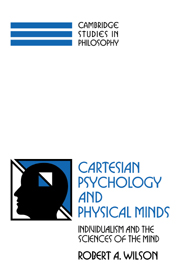1 - Introduction: What is individualism in psychology?
Published online by Cambridge University Press: 05 June 2012
Summary
Individualism in psychology is a view about what mental states are, a view about how mental states are to be individuated, classified, taxonomized, or typed. It is a substantive, plausible, and controversial view that, over the last twenty years, has been the focus of much debate in the philosophy of mind. This introductory chapter has four aims: to clarify what individualism is; to explore why it is an extremely plausible view; to explain why, nonetheless, individualism is a controversial thesis about individuation in the sciences of the mind; and to set out the scope and limits of this book.
NEGATIVE AND POSITIVE CHARACTERIZATIONS OF INDIVIDUALISM
In a frequently quoted passage, Tyler Burge characterizes individualism as the view that ‘the mental natures of all a person's or animal's mental states (and events) are such that there is no deep individuative relation between the individual's being in states of those kinds and the nature of the individual's physical or social environments,’ (1986a:3–4). According to Burge's formulation, individualism makes a negative claim: that the way mental states are individuated is not significantly affected by factors external to the individual who instantiates those states. Individualism is a view about the nature of mental states, a view about what's not strictly relevant to their individuation.
What Jerry Fodor calls methodological solipsism provides the same sort of negative characterization of individualism.
- Type
- Chapter
- Information
- Cartesian Psychology and Physical MindsIndividualism and the Science of the Mind, pp. 1 - 28Publisher: Cambridge University PressPrint publication year: 1995

